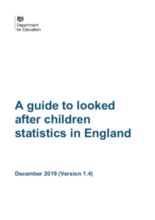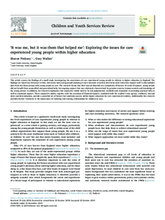Displaying 511 - 520 of 1177
On the 30th anniversary of the UNCRC and the Children Act, join the CFAB 2019 Annual International Child Protection Lecture.
The following article reports upon recent research, which explored the perceptions of professionals of the issues that affect the sexual and criminal exploitation of children in care, along with a discussion of the effectiveness of current responses to these issues and the challenges that professionals face.
The following article reports upon recent research that explored the perceptions of professionals of the issues that affect the sexual and criminal exploitation of children in care, along with a discussion of the effectiveness of current responses to these issues and the challenges that professionals face.
This article presents a critical review of research into post-adoption support in educational settings using a rigorous systematic methodology.
This document provides a guide to looked after children statistics published by the UK Department for Education.
The authors of this study investigated incidence of secondary traumatic stress (STS) and psychological predictors relevant to secondary and primary stress appraisal in UK foster carers.
Cross-sectional analysis by the Scottish Government show that the educational outcomes for looked after children are much poorer than for other children in Scotland. This presentation will discuss methods to create a longitudinal data set from these data and thus infer how a child’s lifetime history of care relates to their educational outcomes.
This article reports the findings of a small study investigating the experiences of care experienced young people in relation to higher education in England.
A European network of fostering organisations, APFEL (Acting for the Promotion of Fostering at European Level) is holding its eighth European conference entitled Foster Care Transforming Lives in Edinburgh on 20 November, in partnership with The Fostering Network.
The aim of this study is to utilise nationwide social services data from two countries (Northern Ireland (NI) and Finland), with similar populations but different intervention policies, linked to a range of demographic and health datasets to examine the mental health outcomes of young adults in the years following leaving care.


